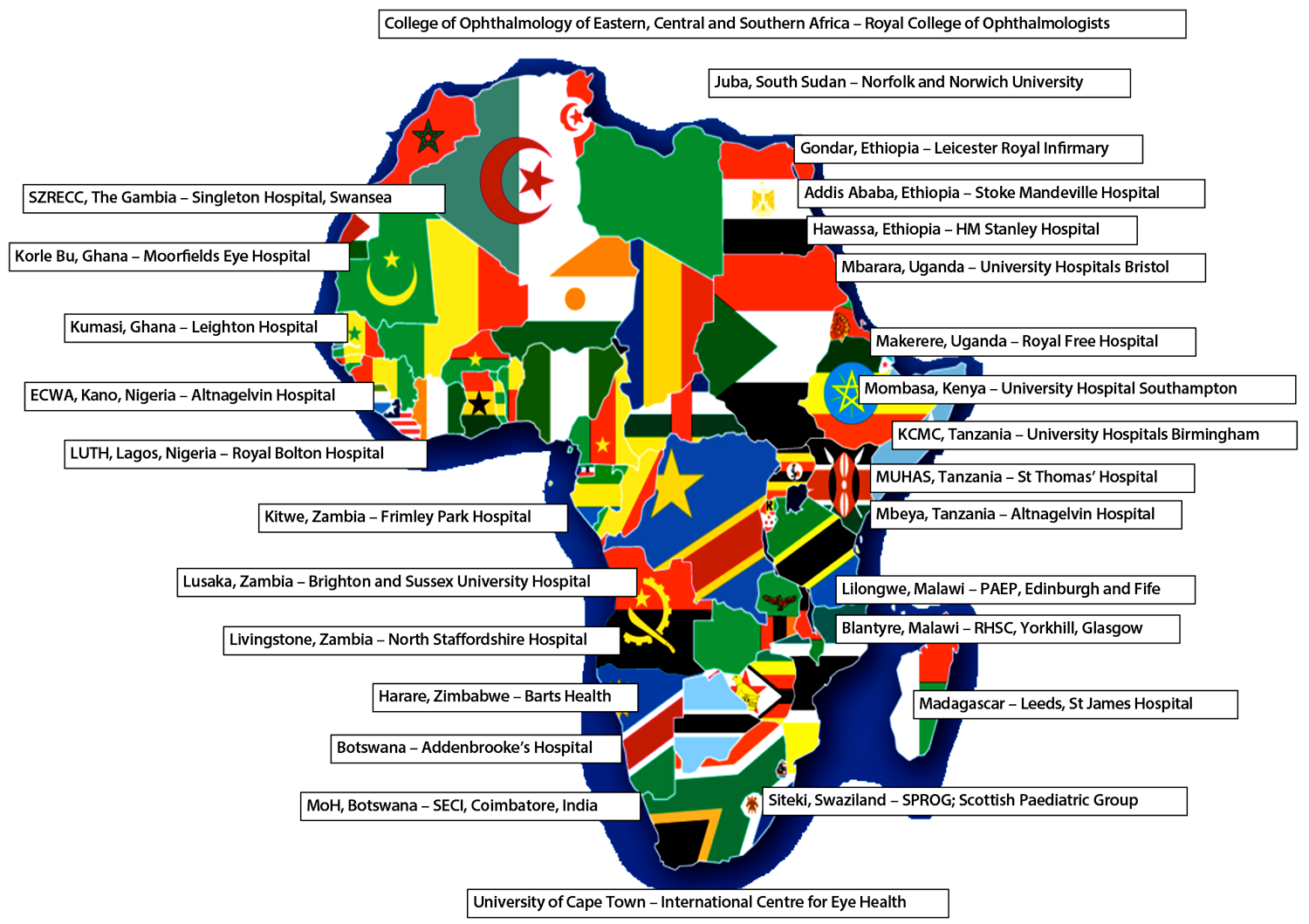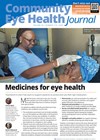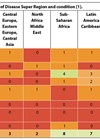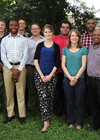The VISION 2020 LINKS Programme celebrates its 10th anniversary next month. Over the past decade it has achieved its objective of building capacity for eye care in developing countries, particularly in Africa, by establishing long-term training partnerships between institutions, known as LINKS. The LINKS Programme contributes to the goal of eliminating avoidable blindness worldwide, and focuses on countries where there are less than three ophthalmologists per million people.
The International Centre for Eye Health, together with leading eye care non-government organisations (NGOs), CBM and Sightsavers, supported the establishment of the Programme. Each LINK is unique; it is based on the specific training needs of the African partner institution. Each LINK prioritises the development of the skills and expertise of the whole eye care team. The goal is assisting services such as children’s eye care or diabetic retinopathy; to improve the quality and quantity of training of eye care professionals and thereby to improve the availability and quality of eye care services.
The achievements of the LINKS Programme have been featured in previous articles in Eye News [1-7]. There are currently 25 active LINKS, and most of these have been running for four years or longer. Through regular training visits, trusting relationships are built between the UK and African / Indonesian partners and knowledge and experiences are exchanged. The benefits of LINKS are felt by both partners, UK teams benefit from learning about unusual and late presentation of diseases and return with cost saving ideas that can be applied to the National Health Service (NHS). They also often feel more motivated after witnessing the efforts of their African colleagues to provide quality eye care services in spite of the limited resources they have available.
As well as celebrating the first ten years, the VISION 2020 LINKS Programme is looking to the future, and it has recently been awarded a new grant to build a network between LINK partners working on diabetic retinopathy across the Commonwealth.
VISION 2020 LINKS partnerships working together to build capacity for elimination of
avoidable blindness in 14 countries of Africa. Map origin: ajmedwards
The new Queen Elizabeth Diamond Jubilee Trust grant
The International Centre for Eye Health (ICEH) – a research and education group based at the London School of Hygiene & Tropical Medicine [8] – was recently awarded, on behalf of a Commonwealth Eye Health Consortium, a grant of £7.1 million by The Queen Elizabeth Diamond Jubilee Trust (the Trust) [9] to advance its work in eliminating avoidable blindness. The consortium – known as the Commonwealth Eye Health Consortium (CEHC) – is made up of Colleges of Ophthalmology, training and academic institutions.
The grant to ICEH from the Trust will fund an innovative five-year programme to build capacity for eye care training, research and service delivery across the Commonwealth. Led by Matthew Burton, Senior Lecturer and Wellcome Trust Senior Research Fellow at ICEH, the programme has seven main objectives:
- To train eye health workers from Commonwealth countries in Public Health for Eye Care, in order to develop the next generation of leaders of prevention of blindness programmes.
- To provide clinical subspecialty fellowship training for ophthalmologists through a network of training institutions across the Commonwealth.
- To provide research fellowships (PhD and post-doctoral level) for particularly talented individuals, to advance the knowledge base to address key VISION 2020 issues affecting the Commonwealth, as well as to empower and develop research leaders of the future for these countries.
- To develop a team training network in several countries to strengthen the capacity to manage diabetic retinopathy in local health systems.
- To develop a new, open educational resource for ophthalmic public health that will be freely available online.
- To improve access to, and quality of, eye health care, particularly in resource-limited and remote locations, through new smartphone-based technologies for the diagnosis of eye disease. (www.peekvision.org)
- To introduce a new electronic patient record system in several countries, providing a support structure to manage information, in a move away from the use of less efficient paper notes. (www.openeyes.org.uk)
The Commonwealth Eye Health Consortium members
(www.cehc.lshtm.ac.uk)
International Centre for Eye Health, LSHTM
College of Ophthalmology of Eastern, Central and Southern Africa (COECSA)
Royal Australian and New Zealand College of Ophthalmologists
Royal College of Ophthalmologists
West African College of Surgeons
Aravind Eye Hospital
University of Cape Town
Centre for Eye Research Australia
Glasgow Centre for Ophthalmic Research
Moorfields Eye Hospital
Ophthalmic Surgical Training Centre, Korle Bu Teaching Hospital
L V Prasad Eye Institute
Singapore National Eye Centre
University of Strathclyde
Ispahani Islamia Eye Institute
Diabetic retinopathy training – the need
A core part of the five-year programme funded by the Trust is the establishment of a pan-Commonwealth Diabetic Retinopathy Team Training Network. The need to tackle diabetic retinopathy (DR) is huge, because diabetes is on the increase in many parts of the world [10], linked to changing lifestyle, obesity and increasing age of the population [11]. African healthcare systems need the capacity to deal with the increasing burden of diabetes and its complications. Lack of public awareness, and lack of appropriately trained health personnel and facilities for detecting, managing and monitoring diabetes and its complications contributes to high morbidity and mortality rates.
The World Health Organization (WHO) estimates that 347 million people worldwide have diabetes [12]. This number is likely to more than double by 2030 without intervention [13]. Almost 80% of diabetes deaths occur in low- and middle-income countries [12]. Diabetic retinopathy is fast becoming a leading cause of blindness and is a frequent cause of blindness among adults of working age.
Regular retinal examination of people with diabetes is necessary because DR is asymptomatic in its early stages and because early intervention reduces both the risk of blindness and the cost of treatment. Early treatment slows or stops the progression of the disease, with improved control of diabetes the most important factor. People who have established sight-threatening retinopathy will require laser treatment. Treatment of established DR can reduce severe vision loss and blindness by 90% [14], but treatment needs to be integrated within a broader diabetes control programme and within an eye health system that can diagnose and support the management of the disease.
“ICEH is very pleased to be the recipient of this generous grant from The Queen Elizabeth Diamond Jubilee Trust. We are looking forward to working with partners across the Commonwealth over the next five years to build capacity for eye care training, research and service delivery. The initiative supported by the grant, including the Diabetic Retinopathy Team Training Network, run by the VISION 2020 LINKS Programme, will help to reduce avoidable blindness in many of the Commonwealth countries.”
Professor Allen Foster, Director,
International Centre for Eye Health.
The Diabetic Retinopathy Team Training Network
The Diabetic Retinopathy Team Training Network is being managed at ICEH by the VISION 2020 LINKS Programme Manager, Marcia Zondervan, and her team. It is based around seven already established LINKS between sub-Saharan Africa and UK eye units (listed left) that have identified a major need for training in DR. In addition, two new LINKS will be developed, one between a Kenyan and a UK eye unit and one between a Caribbean country and a UK eye unit. The aim of the network is to build capacity for the development of DR systems and services. A key component will be training multidisciplinary teams that will work together to deliver integrated care. The network will ensure sustainability through sharing experiences and results amongst the Commonwealth partners.
The following seven African institutions in the VISION 2020 LINKS Programme have identified DR as a major priority. The VISION 2020 LINKS Programme team will oversee and manage the development of the network, including monitoring and evaluation, sharing the learning, disseminating results and reporting.
This programme will also develop a south-south network across multiple Commonwealth countries, mainly in Africa, that are facing similar challenges with DR. With regular training visits to and from their UK LINK partners, who have specific expertise in DR services, over the five years of the grant, the African and Caribbean members of the network will develop protocols, plan and develop services, and build skills in screening, grading, data collecting, treating and monitoring patients with DR.
A multidisciplinary team approach towards DR will be developed, including working with diabetologists and general physicians to identify and screen people with diabetes who are at risk of DR. Involvement of the Ministry of Health (MoH) and National Prevention of Blindness Committee (NPBC) / National VISION 2020 Committee in each country from the outset will help to ensure that changes are embedded within the health system. The close involvement of the MoH and NPBC will also help to ensure sustainability beyond the five years of the project.
The five-year DR project funded by the Trust is primarily focused on developing the network between existing LINKS in Africa, establishing two new DR LINKS, and supporting the development of DR services in the eight countries.

The Queen Elizabeth Diamond Jubilee Trust
The Trust was established to mark and celebrate Her Majesty The Queen’s 60-year contribution to the Commonwealth. Chaired by The Rt Hon Sir John Major KG CH, the Trust’s mission is to enrich the lives of people of all backgrounds across the Commonwealth, and its programmes are working in alliance towards eliminating avoidable blindness and to empower a new generation of young leaders. Its Avoidable Blindness Programme focuses on three main issues: the elimination of blinding trachoma; tackling retinopathy of prematurity and diabetic retinopathy across the Commonwealth.
Since its inception in 2012, the Trust has received support from a wide range of donors across the Commonwealth and beyond, including governments, trusts and foundations, corporate partners, community groups and individuals. The UK Government (through the Department For International Development), for example, has made a commitment to match each pound raised, up to a ceiling of £50 million, and Standard Chartered Bank, through its ‘Seeing is Believing’ initiative, has given 20 million US Dollars to help advance the elimination of avoidable blindness.
VISION 2020 LINKS - the next ten years
The VISION 2020 LINKS Programme continues to grow, with an average of two new LINKS each year. There is strong interest from African institutions to form LINKS and a similar interest from UK eye departments. Both potential partners need to have the support of the senior management of each institution before a match can take place. The Programme Manager, Marcia Zondervan, is always keen to meet new potential UK LINKS teams and their NHS Trust senior management. Each LINK is collecting data to measure the progress made and monitoring the changes that come about as a result of the training, skill-sharing and capacity-building. The existing LINKS partnerships are strongly committed to working together and it is hoped that they will continue for many years to come.
References
1. Zondervan M, Walker C, Astbury N. VISION 2020 Links Programme: building capacity for eye care internationally. Eye News 2013;19(5):34-9.
2. Walker C, Zondervan M, Astbury N. VISION 2020 Links Programme: building capacity in Eastern Africa. Eye News 2013;19(6):48-50.
3. Astbury N, Zondervan M, Walker C. VISION 2020 LINKS Programme: raising standards in Eastern, Central and Southern Africa. Eye News 2013;20(1):46-8.
4. Walker C, Oyewole K, Zondervan M. Building capacity in West Africa: the Moorfields-Korle Bu VISION 2020 LINK. Eye News 2013;20(2):11-4.
5. Subramani S, Okoronkwo A, Robinson J, et al. Developing leadership for eye care in Nigeria: the Lagos-Bolton-North Western Deanery VISION 2020 LINK. Eye News 2013;20(3):28-33.
6. Zondervan M, Walker C. Building capacity for children’s eye care in Africa: the VISION 2020 LINKS Programme. Eye News 2014;20(4):32-6.
7. Ellis J, Muhiddin H, Zondervan M. The invisible touch: a VISION 2020 LINK with Indonesia. Eye News 2014;20(5):24-8.
8. The International Centre for Eye Health (ICEH).
http://iceh.lshtm.ac.uk
Last accessed March 2014.
9. The Queen Elizabeth Diamond Jubilee Trust.
www.jubileetribute.org
Last accessed March 2014.
10. Wild S, Roglic G, Green A, et al. Global prevalence of diabetes: estimates for the year 2000 and projections for 2030. Diabetes Care 2004;27(5):1047-53.
11. Scanlon PH, Aldington SJ, Statton IM. Epidemiological issues in diabetic retinopathy. Middle EasternAfr J Ophthalmol 2013;20(4):293-300.
12. WHO Media Centre. Diabetes.
http://www.who.int/mediacentre/
factsheets/fs312/en/
Last accessed March 2014.
13. United Nations Regional Information Centre for Western Europe. Number of people with diabetes expected to double by 2030.
http://www.unric.org/en/latest-un-buzz/
28027-number-of-people-with-diabetes-
expected-to-double-by-2030
Last accessed March 2014.
14. Prevention of Blindness from Diabetes Mellitus: Report of a WHO Consultation in Geneva, Switzerland, 2005. WHO Press; 2006.
COMMENTS ARE WELCOME














